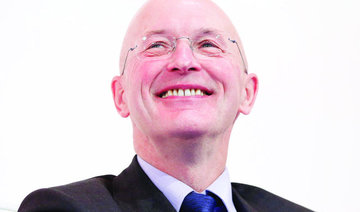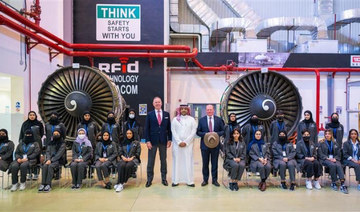What the critics call “big pharma” has had an image problem in recent years, and Andrew Miles, the executive in charge of the global health care company GlaxoSmithKline’s (GSK) business in the Gulf, thinks he knows how to resolve it.
“Choice of medication should be a clinical choice, rather than being based on some potential conflict of interest,” said Miles when we met at the UAE offices of GSK in Dubai.
For the last four years, GSK has been at the forefront of a transformation of the drugs industry. Barraged by allegations of inappropriate payments to doctors and other health care professionals, especially in the hyper-litigious US, GSK took the decision to halt all payments to health care providers (HCPs), and to cease rewarding its sales force according to the number of prescriptions issued for its products.
The initiative grew out of GSK’s “corporate integrity agreement” in 2012, which settled lawsuits in the US, and involved a multibillion-dollar payment to the authorities, but it has become something more for GSK.
“GSK was the first big pharma company to stop payments to HCPs to promote our products. It was a big decision for us, and nobody else has done it, though maybe other pharma groups will follow. Overall, it has had a net positive impact. Governments love it. They want all pharma companies to stop payments and we are advising them how to do it. It is a policy for the long term, good for patients and good for shareholders,” he said.
That initiative is set to have repercussions in the Middle East, where GSK has been involved for 65 years. Miles revealed that GSK is in advisory discussions with the Saudi health authorities to draw up new legislation to better regulate the medical and pharmaceutical industry in the Kingdom.
“We are in dialogue with the Saudi Food and Drug Administration (SFDA) in an advisory capacity, and I don’t think we’re far off some kind of enactment of major legislation on standards of transparency and engagement with the health care industry,” he said.
Saudi Arabia has been a focus of the company long before the 2000 merger between UK firm Glaxo Wellcome and American SmithKline Beecham that produced the sixth biggest drugs company in the world.
In different guises, GSK has had a manufacturing facility in Jeddah since 1992, currently employing 427 people. Between that facility, a distribution hub in Dubai’s Jebel Ali, and sales offices throughout the region, GSK covers a region of increasing interest.
“The GSK footprint in the region has a big heritage and has been expanding over the years,” he said.
Its regional operation mirrors the three-sector global corporate structure: Consumer products like household drugs Panadol and Sensodyne; pharmaceutical and prescriptions products like its blockbuster respiratory drug Advair; and vaccines, ranging from the full-spectrum of children’s vaccines — over half the pediatric vaccines delivered in the UAE are made by GSK — to anti-HIV and anti-malarial treatments.
“We have an integrated strategy in the Gulf Cooperation Council (GCC) markets. The region does not have a lot of intra-GCC trade, but is very similar in terms of language, culture and business practices,” he said.
“We will be able to supply Kuwait and Oman via the UAE and Saudi Arabia. The UAE has a good position as a re-export hub for the rest of the region and Africa via our facilities at Jebel Ali. In Saudi Arabia, 80 percent of the portfolio is locally manufactured in Jeddah. That operation has been there for a long time, but it is now part of the Vision 2030 strategy to expand localization and local employment,” he added.
A major expansion is also planned in the UAE, with manufacturing facilities in Dubai due to be opened next year, making the full range of GSK products. The standoff between Qatar and the four countries of the Anti-Terror Quartet (ATQ) prompted some urgent changes to distribution channels earlier in the summer.
“Products are now going straight from Europe to Qatar, which used to come direct from the UAE, and we believe supply continuity is going well. We saw an increase in demand when the measures (blocking land, sea and air links with Qatar) were first announced, and some stockpiling of medicines,” he said. 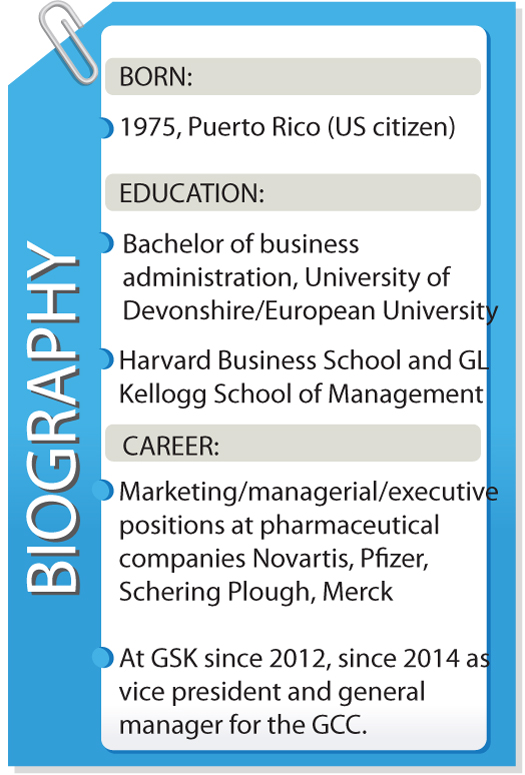
“We are monitoring the situation. We think it could either escalate or de-escalate rapidly, but we don’t see it getting resolved quickly. It could be one or two years on the current status. But really it’s anybody’s guess,” he added.
Even without the distribution changes forced on GSK by the Qatar crisis, other factors are changing the shape of the industry and the traditional marketing methods used by companies.
“The channels of communication with sales reps are all digital now. You might not be able to physically see a sales rep but you can always get experts online,” he said.
And, of course, marketing is being transformed by the decision to stop payments to HCPs. “Before, there were two ways to drive performance. You could pay HCPs to speak on behalf of the science, but this was expensive and problematic. The main concern, however, was the potential conflict of interest involved. So in 2016 we took the decision to stop it completely. Now promotion is purely based on the science. We do still hire HCPs to work for us, to go out and talk about the products, but it is clear they are our employees,” he said.
“The second way was to pay sales representatives by the number of prescriptions issued for a product. We don’t do that anymore either, so again the potential conflict of interest is removed,” Miles added.
Health care is a major pre-occupation in the Gulf and a top priority for policymakers, which has led to a boom in medical-related industries, from the physical provision of hospital and clinic facilities to the expansion of obligatory medical insurance and the growth of pharmaceutical retailers across the region.
But it has not been without its controversies. How does Miles, as a career executive in the “big pharma” sector, see the big issues in health care in the Middle East?
One perennial is the increasing use of antibiotics. Some critics allege that doctors and pharmacists are too ready to prescribe or sell antibiotic treatments for even the most trivial of complaints. The scientific evidence suggests that this is leading to a new generation of “super bugs” that are resistant to traditional penicillin antibiotics, storing up big health problems ahead worldwide.
One of GSK’s biggest products in the region is the ubiquitous antibiotic Augmentin, and Miles concedes that the industry must do more, in conjunction with governments, to curb excessive selling or prescribing.
“There is a risk that the last line of therapy is no longer effective, but there are things that can be done about that. We can invest in new research and development to tackle the superbugs, and we are doing this. But it also revolves around the indiscriminate use of antibiotics. So we need to do more research to monitor the effectiveness and appropriateness of the existing drugs,” he said.
“We must also educate people on the use of antibiotics via prescription. Most illnesses are viral so they are no good anyway. There is a job of education to be done here with the health service providers. We need government support for regulation for the over-the-counter dispensation of antibiotics. The government is taking some steps but more needs to be done,” he added.
The other big issue for the region is in the related field of allergies and respiratory complaints, which have been chronic problems for many in the desert climate.
“We have a big presence in asthma treatment and have a new medicine which presents double the opportunity for asthma control, with a short-acting element to open the respiratory channels and a long-term part to maintain that.
“Maybe because of climate and environment, we’re also looking closely into chronic obstructive pulmonary disease (COPD) at the moment. We’re looking to unveil a ‘blockbuster’ in this area soon. It’s possible now to alleviate the rate of increase in COPD symptoms, and hopefully keep patients out of hospital for longer,” he said.
“COPD and asthma are closely connected, and around 5 percent of asthma patients get acute symptoms. There are around 50,000 people in the GCC with severe asthma who are not currently getting treated. Our new drugs, Relvar and Nucala, tackle this problem and the response has been incredible,” Miles said.
Other blockbusters are also in the pipeline. “Our big new product Shingrix, which will be launched in 2019, is to treat shingles, with an 80 percent prevention rate,” Miles said.
GSK has also been at the forefront of treatment for HIV. “We’ve launched HIV products across the world and the region, to dramatic effect. In the 1980s, it was a death sentence, now it’s under control in all areas, with the possible exception of sub-Saharan Africa. You’re more likely to die of old age even if you have contracted HIV. But we have to emphasize that healthy lifestyles should not be relaxed,” he said.
In Africa and India, GSK has given up its license rights for anti-HIV products to local producers. In many cases, patients and hospitals in those countries could not afford advanced HIV treatments, so GSK in partnership with the Bill & Melinda Gates Foundation waived its right to license fees.
Meningitis is another area where GSK is active. Its incidence always increases during the Hajj season, when pilgrims are in close proximity to each other. “We have developed several vaccines to treat meningitis,” he said.
Other diseases like malaria and polio are also on GSK’s target board, but again there are other factors at play. On malaria, he said: “It’s the biggest killer in the world, but was not well researched because the commercial opportunities are not there. We have a vaccine, which is 50 percent effective, which we are supplying to some countries at cost. But it needs other measures — like water quality control and preventive netting — to make it more effective,” he said.
“Polio too is a problem with a regional resonance. It has largely been eradicated in most of the world, with the exception of some cases in Afghanistan, Pakistan and (now) Syria, as well as a few cases in West Africa. There is still a cultural problem with polio vaccination in some parts of the Middle East and Asia,” Miles said.
Willingness to bend traditional commercial imperatives to the medical needs of communities, in cooperation with governments, is a sign of what some industry analysts have called “new pharma.”
GSK has consciously set out to take a lead in promoting the more progressive, compassionate side of the industry.
At GSK, that change is likely to be accelerated by the arrival of a new British chief executive of the group, Emma Walmsley, who plans to visit the Middle East soon. “The old model couldn’t continue to exist, it had outlived its purpose,” said Miles.
Regional GlaxoSmithKline chief reveals how ‘new pharma’ is changing Gulf health care
Regional GlaxoSmithKline chief reveals how ‘new pharma’ is changing Gulf health care

Riyadh Air to expand fleet with additional aircraft orders, CEO reveals

RIYADH: Saudi Arabia’s Riyadh Air plans to bolster its aircraft lineup through additional orders, as it requires “a very large fleet” to establish itself alongside regional giants, stated the CEO.
This move comes as the Kingdom’s second flag carrier, backed by the country’s Public Investment Fund, ordered 39 Boeing 787-9 jets last year, with options for 33 more.
It also aligns well with Saudi Arabia’s goal to expand its aviation industry and attract more tourists, broadening its airline capacity beyond pilgrimage travel, which currently forms the backbone of the country’s inbound tourism.
“We need a very large fleet, we’re going to make a number of additional orders,” CEO of Riyadh Air, Tony Douglas, said in an interview with Bloomberg Television.
He added: “We will be making a narrowbody order, we’ll probably be doing another large order after that to build us up to scale.”
During the interview, Douglas, who previously led the Abu Dhabi flag carrier Etihad Airways, expressed being “very conscious” of potential delays to aircraft deliveries. This concern arises as both Boeing and Airbus SE grapple with production challenges amidst record demand and supply issues at the two plane makers.
The establishment of a second Saudi national airline alongside the existing flag carrier Saudia is part of the Kingdom’s economic diversification plan.
In November 2023, Douglas expressed confidence in the demand for travel. “We’re not well enough connected. It’s as simple as that,” he said at the time.
The new airline stands to benefit from Saudi Arabia’s rapidly growing economy and the increasing influx of tourists to the Kingdom. Riyadh Air does not intend to pursue mergers and acquisitions to fuel its growth. “No, it’s organic,” Douglas emphasized at the time.
The initial destinations will include major cities in Europe, the US East Coast, and Canada, with the inaugural flight scheduled to depart by June 2025.
By that time, Riyadh Air will have secured slots at major airports, Douglas mentioned, although hubs like London Heathrow are already operating close to capacity.
“It won’t be easy ... but we have no reason to be anything other than confident that we’ll resolve all of that,” he said at the time.
Saudi Arabia and Egypt retain top spots in MENA travel preferences: Wego study

RIYADH: Saudi Arabia and Egypt remain dominant destinations among Middle East and North Africa travelers in 2024, retaining top spots in international preferences, according to a study.
Singapore-based travel booking app Wego ranked Egypt as the top destination for tourists from the region between January and April, followed by the Kingdom, with India consistently holding the third spot since 2016.
Saudi Arabia’s second spot on the wish list is a clear indication of the Kingdom’s progress as a global tourist destination, aligning with its National Tourism Strategy aiming to attract 150 million visitors by 2030.
“We are excited to see Egypt emerge as the leading destination for travelers in the MENA region during Q1 2024. According to Wego's data, Egypt stands out as a favored choice among travelers seeking unique cultural experiences and diverse attractions,” said Mamoun Hmedan, chief business officer at Wego.
He added: “Meanwhile, the United Kingdom retains its position as the preferred European destination for Middle Eastern travelers.”
Among Middle East destinations, the top three — Egypt, Saudi Arabia, and UAE —maintained their positions from 2023. Egypt and the Kingdom, in particular, have consistently held the top two spots since Wego began tracking customer trends over a decade ago.
The study utilized traveler searches and hotel booking data from its website as the foundation for its findings.
The report further revealed that the UAE ranked as the fourth favorite destination, followed by Pakistan, Kuwait, and Turkiye.
Meanwhile, China dropped one spot, reaching the 27th top destination among MENA travelers.
The UK remains the top European destination from the Middle East, holding the first spot for 10 of the last 11 years, briefly overtaken during the pandemic. Italy has notably surged from fourth to second.
Italy, a top global tourist spot, consistently ranks in the top ten European destinations for Middle East travelers.
This year marks Italy’s debut in the top three. Joint investments between Saudi Arabia and Italy in late 2023, along with direct flights by ITA Airways to Riyadh and Jeddah, signify growing ties.
Countries farther from the Gulf region, such as Morocco, Indonesia, and the US experienced the most decline among top destinations.
This trend continued in 2024, with Malaysia, the Philippines, and the US dropping out of the global top 10, while Kuwait, Pakistan, and Jordan, which entered the top ten last year, remain preferred destinations for MENA travelers.
Closing Bell: TASI edges down to close at 12,372 points
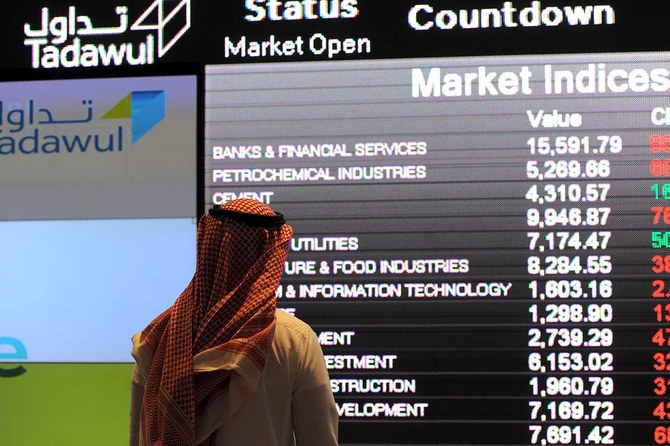
RIYADH: Saudi Arabia’s Tadawul All Share Index dipped on Monday, losing 0.61 points, to close at 12,372.50.
The total trading turnover of the benchmark index was SR7.36 billion ($1.96 billion) as 116 stocks advanced, while 110 retreated.
Similarly, the MSCI Tadawul Index decreased by 2.63 points, or 0.17 percent, to close at 1,549.13.
On the other hand, the parallel market, Nomu, increased, gaining 0.85 points, to close at 26,791. This comes as 20 stocks advanced while as many as 39 retreated.
The best-performing stock was Bupa Arabia for Cooperative Insurance Co. as its share price surged by 10 percent to SR275.
Other top performers included the Mediterranean and Gulf Insurance and Reinsurance Co. and Al-Rajhi Company for Cooperative Insurance, whose share prices soared by 9.97 percent and 9.93 percent, to stand at SR33.10 and SR148.40 respectively.
The worst performer was Arabian Internet and Communications Services Co., whose share price dropped by 4.46 percent to SR334.4.
Saudi Cable Co. as well as Gulf Insurance Group, did not perform well, as their share prices dropped by 3.55 percent and 3.01 percent to stand at SR76 and SR33.85, respectively.
On the announcements front, Bupa Arabia for Cooperative Insurance Co’s profits surged to SR359 million, during the first quarter of 2024, up 91 percent from SR189 million in the same quarter of the previous year.
According to Al-Ekhbariya, net investment income reached SR158 million in the first quarter compared to SR102 million in the same quarter of the previous year, marking a 54 percent increase.
Insurance revenues for the current quarter amounted to SR4.37 million, compared to SR3.75 million in the same quarter of the previous year, reflecting a significant increase of 16.63 percent.
This growth is primarily attributed to operational expansion and an increase in the number of insured individuals, as reported by the channel.
Al-Rajhi Company for Cooperative Insurance also announced its interim financial results for the period ending March 31 with revenues increasing to SR1.4 million from to SR865,298 during the similar quarter of the previous year.
This marked an increase of 50.6 percent attributed the increase to a growth in overall business volume, according to a Tadawul statement.
Similarly, net profit after zakat attributable to shareholders for the current quarter amounted to SR111,376, compared to SR61,282 during the similar quarter in previous year, an increase of 81.7 percent.
According to the company, the improvement stemmed from increased net insurance service results, rising to SR113,229 from SR97,616 in the previous year, a 16 percent surge due to business growth.
Pakistan ‘high priority' economic opportunity for us, Saudi top minister says in Islamabad
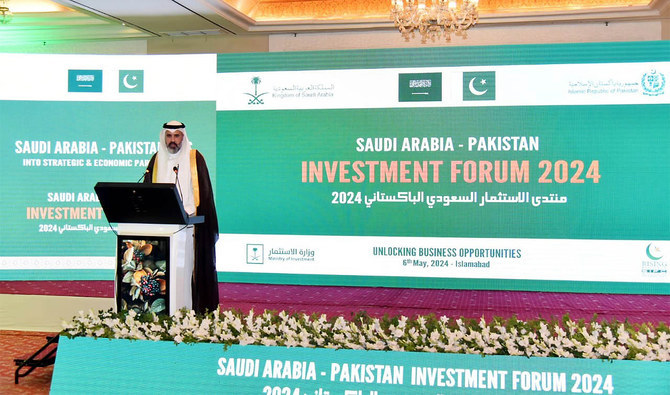
- 50-member Saudi delegation with representatives from 30 companies in Pakistan for investment conference
- 125 Pakistani companies negotiating with Saudi companies visiting Pakistan, petroleum minister says
ISLAMABAD: Pakistan is a “high-priority economic investment and business opportunity” for Saudi Arabia, the Kingdom’s Assistant Minister of Investment Ibrahim Al-Mubarak said on Monday, as a two-day Pak-Saudi investment conference kicked off in Islamabad with a focus on business-to-business engagements.
A 50-member delegation led by Al-Mubarak arrived in Pakistan on Sunday, comprising some 30 Saudi companies from the fields of IT, telecoms, energy, aviation, construction, mining exploration, agriculture and human resource development.
“To the Saudi government and Saudi companies, Pakistan is considered a high-priority economic investment and business opportunity,” Al-Mubarak said as he addressed the investment summit.
“We believe in the great potential of Pakistan's economy, demographics and talent as well as location and natural resources.”
Al-Mubarak said this was his second visit to Pakistan in two weeks and many influential leaders from globally renowned Saudi companies were part of his delegation.
“Today, we want to connect you [Pakistan] all to Saudi companies who desire to continue building their international presence, for Saudi Arabia's ambitions do not stop at our borders and we would like to see Pakistan as one of our leading international partners,” the Saudi official added.
“So, this gathering provides a wonderful opportunity for them [Saudi companies] to develop a deeper understanding of the great opportunities available for investment in Pakistan and to learn about related regulations, requirements, and incentives.”
Addressing a press conference in Islamabad, Petroleum Minister Dr Musadik Malik said 125 Pakistani companies were negotiating with the Saudi companies who were visiting Pakistan.
“First, there were government-to-government agreements during the visit of the Saudi foreign minister [last month] and now there will be business-to-business agreements,” he said.
“To facilitate the visiting Saudi companies, the Pakistani commerce ministry has affiliated one focal person with each Saudi company.”
Minister for Commerce Jam Kamal Khan said Pakistani and Saudi companies were discussing joint ventures and collaboration in diverse sectors.
“This delegation includes high officials of more than 32 Saudi companies … Saudi businessmen will invest in Pakistan in different stages,” Khan said at the press conference.
“Pakistani companies are present here, in the energy sector, in the food sector, in the construction sector, in the renewable section, in the ports and shipping section, and the IT services and general services.”
He said the visit by the Saudi delegation was “just the beginning” and now a Pakistani delegation would visit the Kingdom “to move forward towards the implementation phase.”
INVESTMENT PUSH
Pakistan and Saudi Arabia have been closely working in recent weeks to increase bilateral trade and investment deals, with Crown Prince Mohammed bin Salman last month reaffirming the Kingdom’s commitment to expedite an investment package of $5 billion.
The Saudi business delegation’s visit comes on the heels of one by Sharif to Riyadh from Apr. 27-30 to attend a special two-day meeting of the World Economic Forum.
On the sidelines of the WEF conference, the Pakistani PM met and discussed bilateral investment and economic partnerships with the crown prince and the Saudi ministers of finance, industries, investment, energy, climate, and economy and planning, the adviser of the Saudi-Pakistan Supreme Coordination Council and the presidents of the Saudi central bank and Islamic Development Bank.
This was Sharif’s second meeting with the crown prince in a month. Before that he also met him when he traveled to the Kingdom on April 6-8. The Saudi foreign minister was also in Pakistan last month, a trip during which Pakistan pitched projects worth at least $20 billion to Riyadh.
Pakistan and Saudi Arabia enjoy strong trade, defense and cultural ties. The Kingdom is home to over 2.7 million Pakistani expatriates and serves as a top source of remittances to the cash-strapped South Asian country. During the first half of the current financial year, bilateral trade between Pakistan and Saudi Arabia was recorded at $2.482 billion, with Pakistan’s exports of $262.58 million and Saudi exports of $2.219 billion.
Saudi Arabia has often come to Pakistan’s aid in the past, regularly providing it oil on deferred payments and offering direct financial support to help stabilize its economy and shore up forex reserves.
As things stand, Pakistan desperately needs to shore up its foreign reserves and is in talks with the International Monetary Fund (IMF) for a new bailout deal, for which it needs to signal that it can continue to meet requirements for foreign financing which has been a key demand in previous loan packages.
Last year Pakistan set up the Special Investment Facilitation Council, a body consisting of Pakistani civilian and military leaders and specially tasked to promote investment in Pakistan. The council is so far focusing on investments in the energy, agriculture, mining, information technology and aviation sectors and specifically targeting Gulf nations.
Saudi domestic tourism records steady growth in Q1 2024
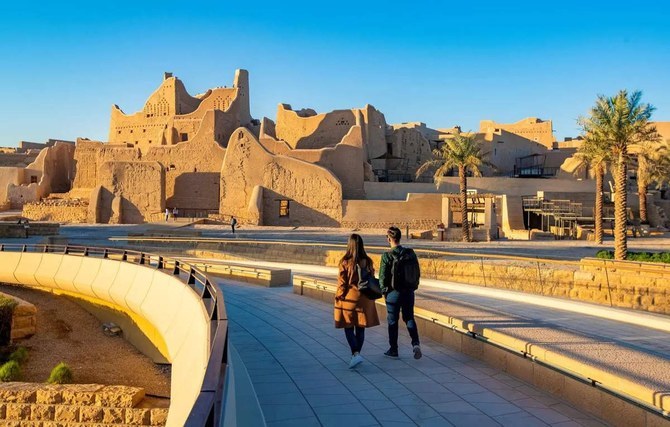
RIYADH: Domestic tourism in Saudi Arabia witnessed steady growth during the first four months of 2024, an industry report showed.
The report, based on the data extracted from Almosafer’s consumer travel platforms, showed that 53 percent of the total bookings accounted for local tourist destinations.
The top domestic destinations were Makkah, Riyadh, Jeddah, Alkhobar, and Abha while people also showed keen interest in visiting AlUla, Tabuk, and Hail.
The sustained interest in domestic tourism showcases the success of government and private sector initiatives to boost local tourism, resulting in a 29 percent increase in total domestic booking volume across Almosafer channels.
Flights saw a 27 percent increase compared to the same period last year while hotel bookings rose by nearly double at 40 percent in the same duration.
With Saudi Arabia’s tourism sector booming, travelers are keen to make the most of their breaks as they focus on in-destination experiences.
The addition of more flight routes, an increase in capacity, and the opening of new airports in the Kingdom has led to more affordable flight options on low-cost carriers, while Saudi travelers are willing to spend on luxury stays with 51 percent of hotel bookings on the platform being for 5-star properties and experiences, they are taking advantage of budget-friendly flight options.
Data showed an overall jump from 55 percent in 2023 to 62 percent among travelers opting to fly low-cost this year.
Internationally this year 46 percent of total bookings were done for low-cost carriers compared to 44 percent in 2023.
In terms of international destinations, Dubai, Doha, Manama, Cairo, and Istanbul remain the top favorites among Saudis. At the same time, there has been a significant shift of focus toward South Asia and the Far East with Tokyo, Singapore, and Bangkok increasingly seeing more footfall from Saudi travelers.
European capitals including Madrid and Amsterdam are also emerging as trending destinations for bookings made in the first four months of 2024.
It is worth noting that the Kingdom hosted 27.4 million international and 79.3 million domestic tourists in 2023, witnessing 65 percent and 2 percent growth compared with 2022, respectively.
The tourism sector has become important to the national economy, as spending on tourism by domestic and international tourists exceeded SR250 billion ($66.7 billion) in 2023. The sector is set to contribute 10 percent to the non-oil gross domestic product and create 1 million job opportunities by 2030. This spending represented more than 4 percent of the Kingdom’s GDP and 7 percent of the non-oil GDP, highlighting the significance of the tourism sector to the Kingdom’s economy.
According to a World Tourism Barometer report released in January 2024, Saudi Arabia topped UN Tourism’s ranking for the growth of international tourist arrivals in 2023 compared with 2019 among large destinations, achieving a 56 percent increase in international tourist arrivals.
Additionally, the report indicated that Saudi Arabia recorded a remarkable tourism recovery rate of 156 percent in international tourist arrivals in 2023 compared with 2019.
These notable achievements have positioned the Kingdom as a leader in the Middle East’s global tourism recovery. It was the only region to surpass pre-COVID-19 pandemic levels, with a 122 percent recovery rate in international tourist arrivals in 2023 compared with 2019.



